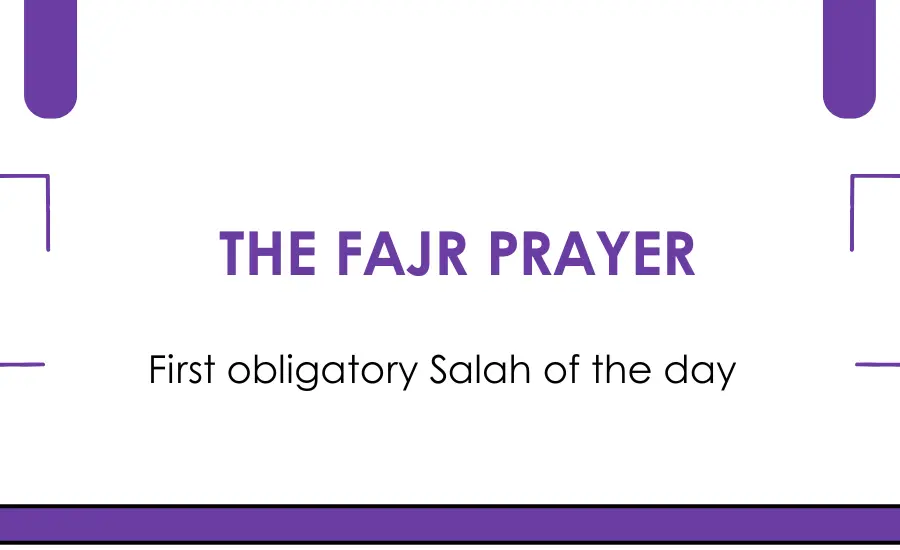The Fajr prayer marks the beginning of a Muslim’s daily connection with Allah (SWT). It is the first of the five obligatory prayers (Salah or Namaz) and holds a unique spiritual and physical significance. Performed at the break of dawn, Fajr symbolizes awakening, not only from sleep but also from heedlessness ,reminding believers of their purpose in life: to worship Allah and seek His pleasure.
In today’s fast-paced world, where sleep and comfort often overpower spiritual discipline, the Fajr Namaz serves as a test of faith, sincerity, and devotion. It is a time when the world is silent, yet the heavens are open for supplications. The Prophet Muhammad (peace and blessings be upon him) emphasized its virtues repeatedly, making it a cornerstone of a believer’s daily worship.
Meaning and Timing of Fajr Prayer
The word “Fajr” (فجر) literally means dawn or daybreak. It signifies the splitting of darkness by the first light of morning. Fajr prayer consists of two rakats (units of prayer) and must be performed before sunrise. Allah (SWT) commands in the Holy Quran:
اَقِمِ الصَّلٰوةَ لِدُلُوكِ الشَّمْسِ اِلٰى غَسَقِ الَّيْلِ وَقُرْاٰنَ الْفَجْرِ ۖ اِنَّ قُرْاٰنَ الْفَجْرِ كَانَ مَشْهُوْدًا
Transliteration: Aqimis salata liduluki shamsi ila ghasaqil laili wa quranal fajr, inna quranal fajri kana mashhudan.
Translation: “Establish prayer at the decline of the sun until the darkness of the night, and [also] the recitation of dawn. Indeed, the recitation of dawn is ever witnessed.” (Surah Al-Isra 17:78)
This ayah highlights that the Fajr recitation is witnessed by the angels, showing the elevated status of this early prayer in the sight of Allah.
Number of Rakats in Fajr Namaz
The Fajr prayer consists of 2 Sunnah rakats and 2 Fard rakats, making a total of 4 rakats:
- 2 Sunnah (Muakkadah): highly emphasized Sunnah
- 2 Fard (Obligatory): mandatory to perform
The Prophet Muhammad (peace be upon him) said about the Sunnah of Fajr:
رَكْعَتَا الْفَجْرِ خَيْرٌ مِّنَ الدُّنْيَا وَمَا فِيهَا
Transliteration: Rak‘at al-Fajr khayrun min ad-dunya wa ma fiha.
Translation: “The two rakats of Fajr (before the obligatory prayer) are better than this world and all that it contains.” (Sahih Muslim 725)
The Fajr prayer consists of a brief yet deeply rewarding set of four rakats i.e. two Sunnah and two Fard. The Prophet (PBUH) highlighted that the Sunnah rakats alone surpass the entire world in value, showing how precious this early act of worship is. Even these few moments before sunrise carry immense spiritual reward and reflect Allah’s boundless mercy toward His servants. This shows the immense reward attached to even the Sunnah part of Fajr, indicating the great mercy of Allah.
Virtues and Rewards of Fajr Prayer
Fajr is not just the start of a Muslim’s day, it is the gateway to divine protection and blessings. Numerous hadiths speak about the unique reward and safety granted to those who perform Fajr regularly.
1. Allah’s Protection throughout the Day
Starting your day under Allah’s guarantee of safety is among the greatest blessings for a believer. Whoever performs the Fajr prayer enters the day under Allah’s divine protection and care. This sacred safeguard shields the believer from harm, misguidance, and evil throughout the day. Beginning the morning in obedience to Allah ensures peace, security, and blessings in every step that follows.
مَنْ صَلَّى الصُّبْحَ فَهُوَ فِي ذِمَّةِ اللَّهِ
Transliteration: Man salla as-subha fahuwa fi dhimmatillah.
Translation: “Whoever prays the Fajr prayer, he is under the protection of Allah.” (Sahih Muslim 657)
2. Witness of Angels
At Fajr, both the angels of night and day meet, recording your name among the righteous. During Fajr prayer, a sacred moment occurs when the angels of night and day gather together, witnessing the believer’s devotion. They present the names of those who prayed at dawn before Allah, testifying to their faith and obedience. This divine meeting signifies the high spiritual rank of those who never miss Fajr, as their worship is personally recorded by the angels.
يَتَعَاقَبُونَ فِيكُمْ مَلَائِكَةٌ بِاللَّيْلِ وَمَلَائِكَةٌ بِالنَّهَارِ… وَيَجْتَمِعُونَ فِي صَلَاةِ الْفَجْرِ وَصَلَاةِ الْعَصْرِ
Transliteration: Yata’aqabuna fikum malaikatun billayli wa malaikatun bin-nahar… wa yajtam‘una fi salat al-fajr wa salat al-asr.
Translation: “Angels take turns among you by night and by day, and they all assemble at the Fajr and Asr prayers.” (Sahih Bukhari 555)
3. Light on the Day of Judgment
Those who leave their beds in the darkness of dawn to pray Fajr in the masjid are promised a brilliant light on the Day of Judgment. This divine illumination will guide and honor them among the believers, reflecting the sincerity and sacrifice they showed in worshipping Allah when others were asleep. It is a symbol of faith shining both in this world and the Hereafter.
بَشِّرِ الْمَشَّائِينَ فِي الظُّلَمِ إِلَى الْمَسَاجِدِ بِالنُّورِ التَّامِّ يَوْمَ الْقِيَامَةِ
Transliteration: Bashshir al-mashsha’ina fi dhulum ila al-masajid bin-nur at-tam yawma al-qiyamah.
Translation: “Give glad tidings to those who walk to the masjid in the darkness of complete light on the Day of Judgment.” (Sunan Abu Dawood 561)
Spiritual Benefits of Fajr Namaz
Below are some significant benefits of namaz-e-fajr:
- Strengthens Faith (Iman): Waking up before sunrise purely to worship Allah strengthens belief and sincerity.
- Brings Peace and Focus: The tranquility of dawn allows deep concentration and mindfulness.
- Boosts Productivity: Early risers are proven to be more focused, healthier, and spiritually active.
- Protection from Evil: Fajr guards the believer from laziness, heedlessness, and the whisperings of Shaytan.
- Gateway to Rizq (Provision): The Prophet (PBUH) prayed for blessings in the early hours.
The Prophet (PBUH) narrated:
“O Allah, bless my nation in their early mornings.” (Sunan Ibn Majah 2236)
Scientific and Psychological Wisdom behind Fajr
Islam’s divine guidance perfectly aligns with human nature and scientific understanding and the Fajr prayer is one of the best examples of this harmony between faith and physiology. Waking up at dawn and performing Salah carries profound physical, mental, and emotional benefits that modern research continues to uncover. The timing of Fajr coincides with the body’s natural biological rhythms, offering health, productivity, and peace of mind to those who observe it consistently.
1. Synchronizing with the Natural Circadian Rhythm
Human beings operate on a 24-hour biological clock known as the circadian rhythm, which governs sleep, alertness, and hormone release. During Fajr time, the hormone melatonin (responsible for sleep) naturally declines, while cortisol (which promotes alertness) begins to rise. Praying Fajr during this transition helps regulate the body’s internal clock, resulting in improved energy levels, better mood, and sharper mental clarity throughout the day.
SubhanAllah, Islam instructed believers to rise for prayer at exactly the time science now recognizes as most beneficial for the body’s natural rhythm.
2. Enhanced Mental Clarity and Emotional Stability
The calm and peaceful environment at dawn allows the mind to be free from distractions and noise, creating the perfect setting for spiritual focus and mindfulness. Studies in neuroscience show that early risers tend to experience lower stress levels, higher cognitive function, and greater emotional stability.
Engaging in dhikr (remembrance of Allah) and Quran recitation at Fajr strengthens positive neural patterns, promoting gratitude, serenity, and emotional resilience against daily pressures.
3. Improved Physical Health and Metabolism
Performing wudu (ablution) and the physical movements of Salah, including bowing, prostrating, and standing, stimulate blood circulation and activate muscles after hours of rest. This gentle activity awakens the body, enhances digestion, and boosts metabolism, preparing one for an active and productive day.
Additionally, the fresh dawn air is rich in oxygen and low in pollution, rejuvenating the lungs and mind, which is why many health experts recommend early-morning breathing or exercise, a practice already embedded in Islam through Fajr.
4. Boost in Productivity and Mental Performance
Psychologists have found that early risers are generally more disciplined, proactive, and successful. The Prophet Muhammad (peace and blessings be upon him) prayed for this blessing, saying:
“O Allah, bless my nation in their early mornings.” (Sunan Ibn Majah 2236)
This dua reflects a timeless truth: beginning the day with Fajr cultivates a sense of purpose, structure, and motivation. It sets a positive tone, aligning both the mind and heart toward discipline and achievement.
5. Reduction in Anxiety and Depression
Engaging in early-morning spiritual activity has been linked to lower anxiety, improved mood, and reduced depressive symptoms. Prayer at dawn connects the believer directly with Allah in solitude, providing spiritual therapy and emotional balance.
Modern psychology agrees that gratitude and mindfulness (core elements of Salah) improve mental well-being and overall life satisfaction.
6. Strengthening Willpower and Self-Discipline
Consistently waking up for Fajr requires commitment, patience, and control over desires; qualities essential for personal development. Psychologists emphasize that such acts of self-discipline build mental toughness and long-term resilience. Over time, a person who never misses Fajr develops a stronger mindset, capable of overcoming laziness and temptation.
7. Social and Community Harmony
Praying Fajr in congregation also offers social and psychological benefits. The sense of unity, belonging, and shared faith among early worshippers fosters emotional connection and mutual support, reducing feelings of isolation. This community bond strengthens overall well-being and mental health.
Summary
The wisdom of Fajr prayer goes beyond spiritual rewards, it is a complete lifestyle prescription for balance, health, and happiness. It aligns human biology with divine guidance, proving that the commands of Allah are designed for both spiritual success and worldly benefit. In performing Fajr, the believer not only earns immense reward but also nurtures a sound mind, a healthy body, and a peaceful soul, living proof that Islam and science speak in harmony when guided by truth.
Common Mistakes Muslims Make Regarding Fajr
- Delaying Fajr until sunrise: invalidates the prayer.
- Skipping Sunnah rakats: though not obligatory, they hold immense reward.
- Praying half-asleep or without focus: affects the spiritual impact.
- Not making wudu properly: a common cause of invalid Salah.
- Not maintaining consistency: Allah loves continuity even in small deeds.
Many Muslims unintentionally lose the blessings of Fajr prayer by falling into common mistakes such as delaying it until sunrise, neglecting Sunnah rakats, or praying without focus. Improper wudu and lack of consistency also weaken the spiritual reward. Striving for mindfulness, punctuality, and regularity helps preserve the true essence and benefits of Fajr Salah.
How to Develop a Habit of Praying Fajr Regularly
- Sleep early: the Prophet (PBUH) disliked staying up late without purpose.
- Set multiple alarms: practical step to ensure you wake up.
- Sleep with intention (niyyah): make the intention before sleeping.
- Ask Allah for help – make dua: “O Allah, make Fajr beloved to my heart and easy for me to perform.”
- Surround yourself with righteous company: those who remind you of Salah.
Building a consistent habit of praying Fajr regularly requires both spiritual intention and practical effort. By sleeping early, setting reminders, and seeking Allah’s help through sincere dua, one strengthens discipline and devotion. Keeping righteous company further inspires consistency, making Fajr a natural and beloved part of daily life.
The Reward of Congregational Fajr
Performing Fajr in congregation multiplies the reward immensely:
صَلاَةُ الْجَمَاعَةِ تَفْضُلُ صَلاَةَ الْفَذِّ بِسَبْعٍ وَعِشْرِينَ دَرَجَةً
Transliteration: Salat al-jama’ah tafdulu salat al-fadh bi sab’in wa ‘ishrina darajah.
Translation: “The prayer in congregation is twenty-seven times more rewarding than the prayer offered alone.” (Sahih Bukhari 645)
Performing Fajr in congregation (Jama’ah) is among the most beloved acts to Allah and a mark of strong faith. When a believer rises from sleep to join others in the masjid for Fajr, he not only gains 27 times the reward, but also earns the honor of being among those remembered by the angels. This collective worship strengthens brotherhood, revives the Sunnah, and brings immense barakah (blessings) to one’s day, both spiritually and physically.
The Fajr Prayer: A True Test of Faith
The Fajr Namaz is not just a ritual but a spiritual awakening and divine opportunity. It trains the soul in discipline, obedience, and gratitude. Those who rise at dawn to stand before their Lord are the true believers mentioned in the Quran:
وَالَّذِينَ هُمْ عَلَىٰ صَلَوَاتِهِمْ يُحَافِظُونَ
Transliteration: Walladhina hum ‘ala salawatihim yuhafizun.
Translation: “And those who guard strictly their prayers.” (Surah Al-Ma’arij 70:34)
May Allah make us among those who never miss Fajr and who rise every dawn with faith, humility, and love for their Creator!
Frequently Asked Questions (FAQs)
What time does Fajr prayer start and end?
Fajr begins at true dawn (when light spreads across the horizon) and ends just before sunrise.
How many rakats are there in Fajr?
There are 2 Sunnah and 2 Fard rakats, totaling 4 rakats.
Can I pray Fajr after sunrise if I missed it?
Yes, if missed unintentionally, it should be made up immediately after sunrise.
What is the dua after Fajr prayer?
A recommended dhikr is:
Allahumma inni as’aluka ilman nafi’an, wa rizqan tayyiban, wa ‘amalan mutaqabbalan.
“O Allah, I ask You for beneficial knowledge, lawful provision, and accepted deeds.”
Why is Fajr so important?
Because it starts your day with remembrance of Allah, brings divine protection, and is witnessed by angels.






